

What Divides Us?: An Interview with Yale College Dean Jonathan Holloway. Amid the many conversations these past two weeks about racism and free speech at Yale University, one moment stood out.
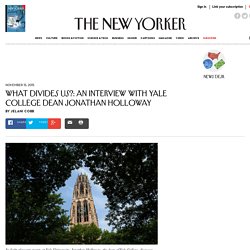
Last Thursday afternoon, hundreds gathered and expressed their grievances about the treatment of students of color to Jonathan Holloway, the first African-American dean of Yale College. Who’s really demanding to be coddled on campus? Yale students aren’t the spoiled brats for refusing to be racially trolled on Halloween. In December of 2012, many Harvard students woke to an unpleasant surprise that had been slid under their doors.
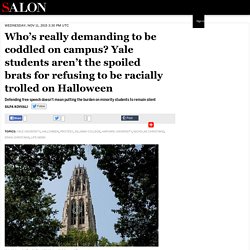
A flyer, circulated by anonymous parties, was seemingly a parodic invitation to a final club. “Inclusion. Diversity. Love.” it read, with footnotes clarifying “Jews need not apply. Seriously, no fucking Jews. In response, the (now former) Dean of the College, Evelynn M. A clash between administrators and students at Yale went viral. Why that is unfortunate for all concerned. Trees bloom on the campus of Yale University in New Haven, Conn.
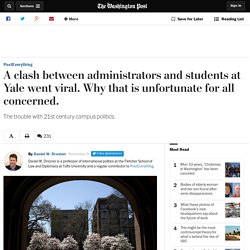
(Christopher Capozziello/Getty Images) Why Recent Yale Protests Aren't Radical Enough. A number of years ago, I was talking to a brilliant undergraduate and feminist at Yale College, where I teach English.

She was discussing something sexist and demeaning that had happened at one of Yale’s several off-campus fraternities—sexism is such a predictable fact of life at frats that I can’t even remember what the particular demeaning act was. It might have been a grope, a slur, some form of mockery. Anyway, the student was wondering aloud what the school’s response should be. I offered some sort of suggestion, probably having to do with which dean or committee she should take her complaint to. But then I added that what would really send a message to the fraternity would be if women organized a boycott of its parties.
More than 1,000 gather in solidarity. Photo Credit: Alex Zhang With the multicolored messages from last Thursday’s chalking event still visible on the pavement, students and supporters gathered once again on Cross Campus yesterday to stand in solidarity after a week of impassioned discussions about race at Yale.
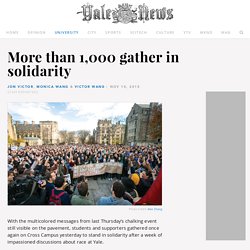
But student organizers and participants said Monday’s March of Resilience — in which hundreds marched from the Afro-American Cultural Center to Cross Campus — had a markedly different tone from the tense confrontation with Yale College Dean Jonathan Holloway that took place at the same location last week. Emotions raw at Yale meeting about racial fraternity episode. NEW HAVEN >> An emotionally charged forum sparked by alleged racist remarks at the Sigma Alpha Epsilon house filled two rooms of the Afro American Cultural Center at Yale on Wednesday night.
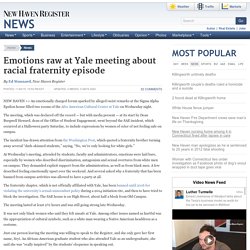
The meeting, which was declared off the record — but with media present — at its start by Dean Burgwell Howard, dean of the Office of Student Engagement, went beyond the SAE incident, which occurred at a Halloween party Saturday, to include expressions by women of color of not feeling safe on campus. The incident has drawn attention from the Washington Post, which quoted a fraternity brother turning away several “dark-skinned students,” saying, “No, we’re only looking for white girls.” At Wednesday’s meeting, attended by students, faculty and administrators, emotions were laid bare, especially by women who described discrimination, antagonism and sexual overtures from white men on campus.
They demanded explicit support from the administration, as well as from black men. How Yale Became the Latest Battleground in the Fight Over Free Speech on Campus. Yale University has become the setting for the latest chapter of a national saga about tensions between free expression and social inclusiveness that's generated tremendous controversy at several college campuses over the past year.
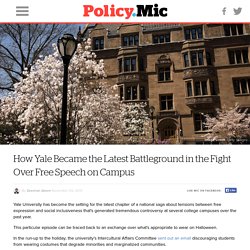
This particular episode can be traced back to an exchange over what's appropriate to wear on Halloween. In the run-up to the holiday, the university's Intercultural Affairs Committee sent out an email discouraging students from wearing costumes that degrade minorities and marginalized communities. Culture, Politics, Academia and Other Shiny Objects. Commenting on the debate over Halloween costumes seems freshly risky this week, but the subject has been on my mind since I read this New York Times article on the subject on October 30.
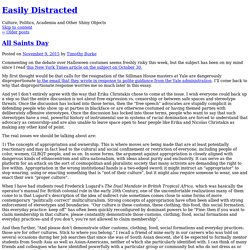
My first thought would be that calls for the resignation of the Silliman House masters at Yale are dangerously disproportionate to the email that they wrote in response to polite guidance from the Yale administration. I’ll come back to why that disproportionate response worries me so much later in this essay. And yet I don’t entirely agree with the way that Erika Christakis chose to come at the issue. I wish everyone could back up a step so that the entire discussion is not about free expression vs. censorship or between safe spaces and stereotype threats.
The Halloween Costume Controversy at Yale's Silliman College. Christakis lives at Yale, where he presides over one of its undergraduate colleges.
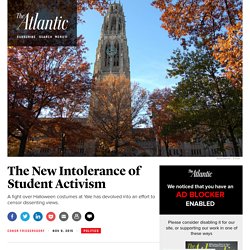
His wife Erika, a lecturer in early childhood education, shares that duty. They reside among students and are responsible for shaping residential life. And before Halloween, some students complained to them that Yale administrators were offering heavy-handed advice on what Halloween costumes to avoid. The Problematic Vilification of Student Activists at Yale. The first time I saw a friend wearing blackface I was a freshman in college.
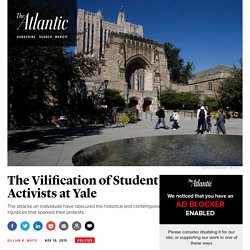
I was stunned. I was hurt. I was enraged. But more than anything, I was confused. He thought it was funny, albeit controversial. Now I have come to expect such acts, and the conversations that surround them, as routine displays of disrespect and cultural cluelessness. The events at Yale over the past weeks have provoked a great deal of conversation, but little effort to understand or acknowledge the cultural and institutional biases at play.
When Yale’s Intercultural Affairs Committee sent around an email suggesting that students, “Take the time to consider their costumes and the impact it may have,” it was asking students to be thoughtful about the choices they made, to think before acting, and to ask themselves whether what they saw as a fun or funny joke might make others feel hurt, offended, or even threatened. Still, some students saw this note from administrators as a form of censorship. The callousness of Erika Christakis’ #Yale intellectualism. Thank you for your interest in Patheos newsletters! Please enter your email address below and click the "Subscribe" button. Thank you for your subscription. You can visit your Preference Center to complete your profile and see what else we have to offer.
We apologize, we were unable to complete your subscription at this time, please try again later. If this error persists please contact us at communications@patheos.com. The Yale Controversy Is Really About Belonging. Annie Murphy Paul is the author of the forthcoming book "Brilliant: The New Science of Smart. " The chandeliers were blazing with light. The long tables were set with china and silver. At the far end of the huge hall, called Commons, hung a colossal blue-and-white banner bearing a single word: YALE. It was December 1991, and I was a first-year student at the university in New Haven, Conn. With more than a thousand of my classmates, I had arrived at Commons to partake in the annual Freshman Holiday Feast.
This scene from my own life at Yale came to my mind as I read news reports and watched online videos concerning the events unfolding at the university over the past two weeks. “Is there no room anymore for a child or a young person to be a little bit obnoxious … a little bit inappropriate or provocative or, yes, offensive?”